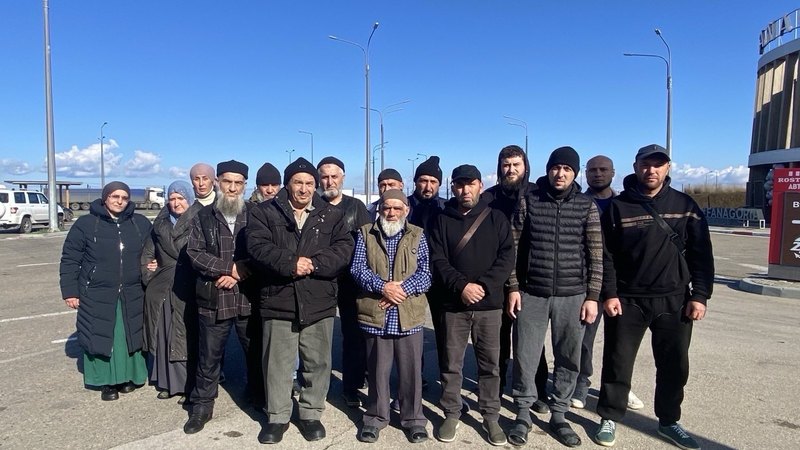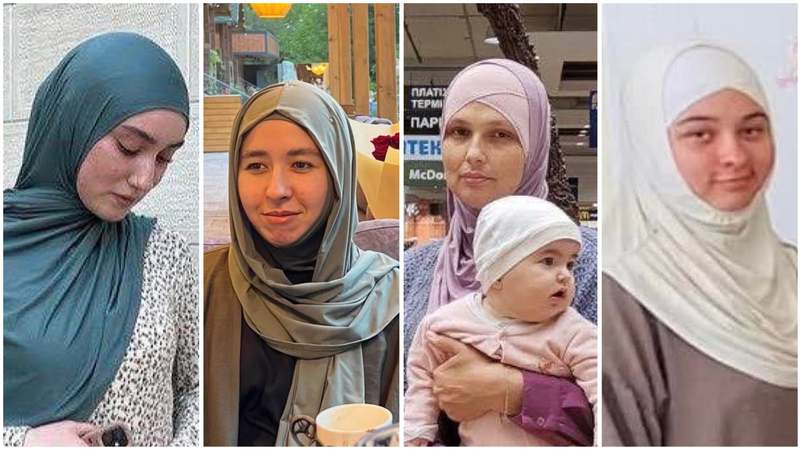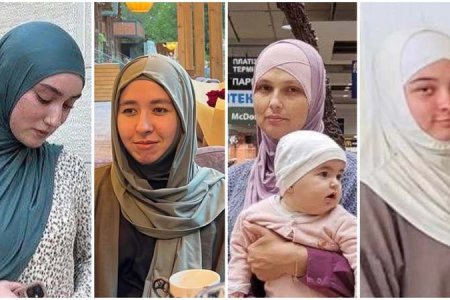
16 Crimean Tatars were detained four times on 30 October 2025, as they travelled as members of a delegation, trying to see Russia’s human rights ombudsperson, Tatyana Moskalkova. The men and women included the parents of four women recently arrested in Russia’s escalation of terror in occupied Crimea, as well as lawyer, Nazim Sheikhmambet.
Russia has already crushed freedom of expression, of conscience and of assembly in occupied Crimea. On Thursday, it demonstrated that Crimean Tatars cannot move about freely, nor exercise their right to approach the Ombudsperson over the politically motivated arrests of four Crimean Tatar women – Esma Nimetulayeva (b. 1985); Elviza Alieva (b. 2005); Fevziye Osmanova (b. 2004); and Nasiba Saidova (b. 2006)
Two delegation set out, travelling in two minivans, during the early hours of 30 October 2025. The driver of one of the minivans explained that they had first been detained after he drove into a petrol station and stopped. Traffic police immediately drove up and, without any explanation, demanded to see his driving licence; documents for the vehicle; and all of his passengers’ passports.
One of the traffic police then received a call during which he was clearly ordered to ‘accompany’ the members of the delegation to the police station. Another member of the delegation told Crimean Solidarity that the police had threatened to arrest them.
The Crimean Tatars were split up into two groups and taken to different police stations. After another officer, whom they were clearly waiting for, arrived, the Crimean Tatars were taken to a hall where each was grilled on where they were going, and with what purpose.
One of the two groups was held at the police station until 2 a.m., the other – until 4 a.m., before being allowed to continue. There continued to be no explanation for such heavy-handed measures.
They were detained again at around 8.30 a.m. with the traffic police this time threatening to call a spetsnaz unit and have them all forced to the ground. They were ordered to drive to a police station where they were told that “they need to undergo a check for extremism”. Yet again, no clear explanation was given as to why they had been detained.
The families of those detained sent formal complaints to the local prosecutor’s office and to Russia’s prosecutor general, asking for urgent measures to be taken to ensure their relatives’ right to free movement and that those obstructing them be held to account.
No action was forthcoming, with the members of the delegation held at the police station for six and a half hours.
It seems clear that the aim was to deter the members of the delegation from continuing. They did not succeed, with Shukri Seitumerov, renowned Crimean Tatar historian and father of three sons, stating immediately that the delegates would continue to Moscow. They had made their plans and reason for going to Moscow quite clear, he said, and there were no grounds for detaining them twice. They wished to speak with Moskalkova, and convey to her their concern over the arrest two weeks ago of four Crimean Tatar women, as well as over the failure by the occupation local authorities to take any action.
They were detained a third time, in Tula oblast, around 200 kilometres from Moscow, and only released three hours later. If the second time, they had been told that they were being “checked for extremism”, this time they were told that the detentions were part of an operation called ‘Anaconda’. This, purportedly, envisages checking vehicles; looking for people on the wanted list and uncovering ‘prohibited substances’.
The delegates refused to be cowered and continued on their way. Late on Thursday evening, a member of the delegation told Crimean Solidarity that they had again, for the fourth time in 24 hours, been detained, this time around 120 kilometres from Moscow. Each was issued with a ‘warning’ about the consequences of committing supposed ‘administrative offences’ or “continuing anti-public behaviour”/

As reported, in conditions of mounting lawlessness and terror in occupied Crimea, there was only one red line that Russia had not crossed in its political and religious persecution of Crimean Tatars. That line was crossed on 15 October when the Russian FSB seized four Crimean Tatar women for its latest fabricated ‘terrorism trial’ based solely on unproven claims of involvement in Hizb ut-Tahrir, a peaceful, transnational Muslim organization which is legal in Ukraine. The persecution in all cases is shocking. Esma Nimetulayeva (b. 1985) is a mother of five young children and wife of a current political prisoner. The other three - Elviza Alieva (b. 2005); Fevziye Osmanova (b. 2004); and Nasiba Saidova (b. 2006) - are very young women, with Nasiba Saidova having turned 19 last week in Russian captivity. All are now facing appallingly long sentences without being accused of any recognizable crime (more details here).
The four women are all devout Muslims, who have been forced to remove their scarves in the SIZO [remand prison], something that is unacceptable to them on religious grounds. The conditions in Russian occupation SIZO are shockingly bad, and the four women are now being subjected to a forced ‘psychiatric examination’, with the conditions there unlikely to be any better.


